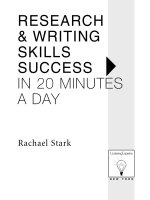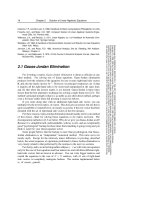Tài liệu RESEARCH AND WRITING SKILLS SUCCESS PART 2 ppt
Bạn đang xem bản rút gọn của tài liệu. Xem và tải ngay bản đầy đủ của tài liệu tại đây (51.82 KB, 7 trang )
LESSON 16 Revising Your Draft 77
LESSON 17 Proofreading and Editing Your Draft 81
LESSON 18 Adding Footnotes, Endnotes, and Parenthetical Citations 85
LESSON 19 Writing a Bibliography 95
LESSON 20 Writing an Annotated Bibliography, a Historiography, and an Abstract 99
POST-TEST 105
APPENDIX A A List of Research Topics 119
APPENDIX B Additional Resources 123
viii
T
his book is designed to help you improve your research skills in just 20 short lessons of 20
minutes a day by using basic research and writing tools that you can practice at home. Each
lesson is carefully designed to make researching any topic and writing a research paper manage-
able and easy. Every lesson teaches different skills, and if you do all the exercises, you should be
able to put together a research paper from start to finish in just a few short weeks.
Although each lesson stands on its own, it’s important to follow the sequence. The lessons
in this book are designed to take you through the initial phases of writing a research paper such
as finding a topic, locating and evaluating your sources, framing your thesis question, and writ-
ing your paper. Because each process is dependent on the others, it is easier to follow the lessons
sequentially so that your skills build on each other.
To help you gauge how much you know about what kinds of materials are available to you
and the best ways to locate those materials, this book begins with a pre-test. This pre-test is
important to take before you start Lesson 1 so that you have a beginning measure of your research
knowledge. Then, when you have finished Lesson 20, take the post-test to see just how much
How to Use
This Book
ix
you’ve learned about putting together a research
paper from initial idea to polished, finished draft.
The most important thing you can do when
you begin to research a topic and write a research
paper is to have fun with your project! Any topic
that you choose to write about will become a fas-
cinating learning experience. The rest of this
introduction will briefly explain a few key skills
that you will learn in order to get the most from
your experience.
Writing Takes Practice
Don’t panic. No one goes to the computer and
knows precisely what he or she wants to write
and exactly how to write it every time. In fact, it’s
normal to sit in front of a blank piece of paper
and take some time just to think; it helps the
words take shape. Enjoy your thoughts and the
moments before you begin writing. Like playing
any professional sport, practice makes perfect. As
a writer, you are a literary athlete and like any
athlete, you just need the chance to flex and tone
your literary muscles so that they are taut and
sleek. To do this, you will learn how to:
■
Ask yourself the right questions to help you
start writing.
■
Brainstorm and list all your ideas to find an
ideal topic.
■
Formulate the perfect thesis question.
■
Prepare a preliminary and easy to follow out-
line.
■
Take good, thorough notes from all your
sources.
Becoming a Detective
Part of writing a research paper is gathering your
materials and doing the actual, physical research.
This is the fun and exciting part. Rather than
feeling overwhelmed, let yourself become a
detective or investigative reporter. You are
exploring uncharted territory, asking questions,
and delving into issues that may not have been
explored before. This book will help you follow
up each lead, ask provocative questions, and
guide you as you:
■
Visit libraries, rare collections, museums, and
other unique cultural institutions that con-
tain valuable information for your paper.
■
Prepare key questions for interviewing pro-
fessionals and other individuals.
■
Seek out new, unique, and alternative sources
of information.
Writing with Authority
Writing a research paper is very similar to writing
an essay. An essay is often an opinion piece that
analyzes a particular topic or book, while a
research paper involves analyzing raw data and
different facts and statistics from a variety of
sources. Once you have collected all your materi-
al, you will learn how to use it as the basis for a
persuasive argument. You will also learn how to:
■
Arrange and organize all your data and
information in a logical sequence.
■
Prepare your materials so that they support
and strengthen your argument.
■
Write an authoritative, convincing draft.
–
HOW TO USE THIS BOOK
–
x
■
Shape and perfect your first draft through
precise editing techniques.
■
Use correct format for citations, footnotes, a
bibliography, and an abstract.
■
Proofread and copyedit your work.
If any of this sounds overwhelming, don’t
worry. Each process will be explained to you
completely in the lessons that follow, and illus-
trative examples will give you models to use as
guidelines. Remember that writing a research
paper is like getting ready to go on an expedition.
You will need the right tools before you begin
your journey. Once you’ve assembled everything,
your “traveling” will be easier.
–
HOW TO USE THIS BOOK
–
xi









